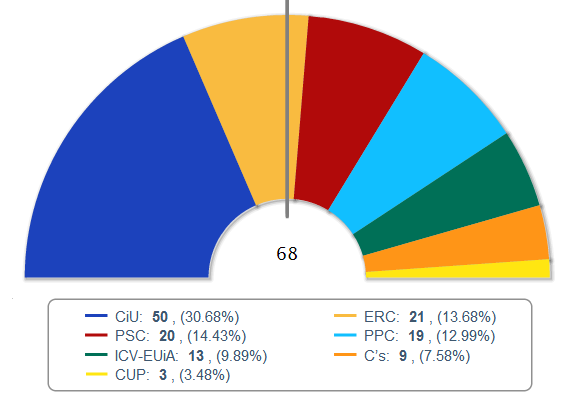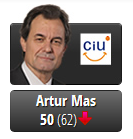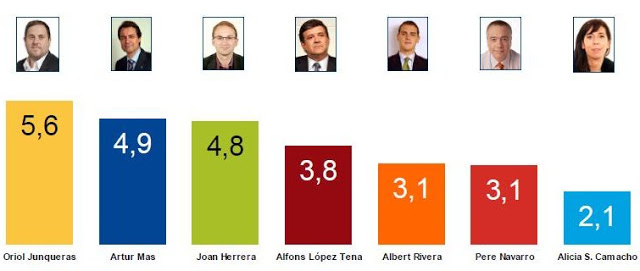Although I made a few comments on the results of the Catalan election in my previous post, I thought it would be a good idea to write something more considered now that I've had a chance to reflect on them.
This was the final result:

An emphatic mandate for a referendum
This election was called primarily to establish a democratic mandate from the Catalan people for a referendum on independence. Of the seven parties that won seats, four of them unambiguously favoured a referendum, winning a total of 87 out of 135 seats. This is an emphatic mandate.
Contrary to some misleading reports, there has in fact been a small overall swing towards parties that favour a referendum. In the previous parliament there were only 86 deputies from pro-referendum parties (including 4 from SI, who all lost their seats in this election).
![]()
Pro-referendum Parties




Anti-referendum Parties



![]()
The only sadness might be that 64.4% of the seats in the Catalan parliament is just short of the two-thirds majority that the Spanish parliament requires in order to amend the Spanish constitution. But there is no requirement for such a super-majority in the Catalan parliament, even though I'm sure those opposed to a referendum will now start claiming that there should be.
A strong swing to the left
The big change in this election has been in the left-right balance of the parliament. In the previous parliament there were 80 deputies from right-leaning parties and 51 from left-leaning parties (I've not counted the 4 deputies from SI on either side because the party was formed solely on a pro-independence platform with deputies specifically drawn from both sides of the political spectrum). There are now 69 deputies on the political right and 66 on the left.
![]()
Parties of the Centre-left and Left





Parties of the Centre-right and Right


![]()
The reasons for this swing to the left are obvious. Both Catalunya and Spain are suffering as a result of the debt crisis, and both have had to take measures to reduce their fiscal deficit. As would be expected from a party of the centre-right, CiU chose to reduce Catalunya's deficit primarily through cuts in public services. They have taken a hit in the polls because the cuts they've made have been particularly savage.
All the autonomous communities were put under pressure to control their budgets by the Spanish government. At one level that's fair enough, but the PP government have been using the economic crisis as a pretext to re-centralize fiscal powers to Madrid, pointing the finger of blame for the level of Spanish debt at the autonomous communities, even though the vast majority of it is held by central government. Artur Mas was caught between a rock and a hard place and in effect said, "There's no need for you in Madrid to take any powers from us; we'll make all the cuts ourselves." In his eagerness to show that he meant it, CiU implemented those cuts with an enthusiasm that bordered on the indecent and went further than was necessary in order to prove a political point. His party has now paid the price for that at the polls.
Forming a new government
We shouldn't lose sight of the fact that, even after the setback of losing 12 seats, CiU still has more than twice the seats and twice the popular support of any other party. They remain the only party in a position to form a government, and Artur Mas will undoubtedly retain his position as President of the Generalitat. The only question is what form his government will take.
It is possible for CiU to form a minority government with no support from any other party, as they did in the previous parliament. This is because some parties are polar opposites of others. There is no way that a right wing, anti-independence party like the PP will ever see eye-to-eye with left wing, pro-independence parties like ERC and CUP. It is hard to imagine an issue on which they would ever vote the same way. Therefore the PP's 19 votes will be effectively cancelled by 19 of the votes from ERC and CUP deputies. With 38 votes effectively "paired", there are 97 votes remaining; and CiU, with 50 of those votes, would therefore have a slim majority.
I'm not saying that this would be a comfortable position for CiU to be in, not least because the two constituent parts of CiU (the CDC and UDC) do not always agree. Nor am I saying it is likely to happen ... but it is an option.
-
The alternative is for CiU to go into coalition with another party. Because 68 seats are needed for a working majority, the only parties large enough to be coalition partners are the PP, the PSC and ERC.
In other circumstances, the PP would be a natural choice. Both parties are to the right of centre, and for the past two years CiU have relied on the PP's votes (on a "variable geometry" basis rather than as part of a formal agreement) in order to implement their austerity agenda. For with 62 seats, CiU were 6 votes short of a majority. However it's much harder to imagine any degree of co-operation between the two parties now, especially after the torrent of abuse from the PP government in Madrid during this election campaign, and the dirty tricks that they are widely suspected of orchestrating.
It might, just, have been possible for CiU to work with the PSC if the PSOE were in power in Madrid, and therefore in a position to negotiate some sort of agreement on an independence referendum along the lines of the Edinburgh agreement between the UK and Scottish governments. But they're not ... and even if they were, the PSC probably wouldn't be interested.
-
That leaves ERC. To my mind, there is no doubt that this is the alliance CiU would prefer. However the ERC's spectacular showing in the election, and in particular the fact that they are now the second largest party, gives Oriel Junqueras options that he and the ERC wouldn't have had otherwise. On behalf of the pro-independence left across Europe, allow me the indulgence of showing this graphic from a GESOP survey on approval ratings for the main party leaders. It goes a long way towards explaining why ERC did so well in this election:

In my comments on Sunday night, I said that I thought it would be better for ERC to take advantage of its position as the second largest party in the Catalan parliament to become the official opposition, perhaps in alliance with ICV and CUP as a 37 seat bloc of pro-referendum left wing parties. They would of course work with CiU on the arrangements for the referendum and negotiations of things like the terms of EU membership, but would be able to oppose the excesses of CiU's austerity package. This option has now been advocated by Alfred Bosch, leader of ERC in the Spanish parliament, as reported here in the New York Times.
But with the benefit of a day or so to reflect, I now wonder whether this is such a good idea.
-
My main concern is the flakiness of CiU. Although I respect the comments on the previous post and elsewhere about a referendum now being certain, I can imagine it being derailed. First, we need to bear in mind that CiU came to the position that independence was the only option left for Catalunya only as a result of the 1.5m turnout on 11 September. Prior to this CiU had been lukewarm about independence, and indeed there are some elements within the UDC part of CiU that are opposed to independence.
Second, Artur Mas is not exactly in a strong position within his party as a result of losing 12 seats. Fingers of blame will be pointed at him, and he might consider that keeping his party together and keeping it in power is more important than securing independence. And even if he were determined to press on, infighting behind his back would be a distraction he couldn't ignore.
Imagine a situation where the EU procrastinates over how to handle the situation in the face of reluctance by some member states to bail Spain out, so that their economy is in danger of falling off the edge of the cliff. Imagine riots in the streets of Spanish cities that make what's happened in Greece look tame, and generals in the armed forces champing at the bit to go in and impose a version of public order that would make Franco proud of them. Imagine Spanish leaders having to acknowledge that their economy needs Catalunya far more than Catalunya needs Spain and belatedly offering Artur Mas the same fiscal arrangements as the four Basque provinces enjoy ... reminding him that this, after all, was what he and his party originally wanted.
Could the pressure to give way on independence, especially if backed by major international powers and accompanied by the promise of a package of financial aid (perhaps to write off Catalunya's not inconsiderable debt) prove too much for him? I'm not saying it would be. Perhaps he's made of stronger stuff. But it's a risk ... especially for a party that is a late convert to independence rather than having it as one of its core aims.
A route forward
Because I think Artur Mas is going to need all the help he can get, I'm now inclined to think it would be better for UiC and ERC to work out a formal programme of government together, based on a clear timetable for a referendum and establishment of the structures necessary for Catalunya to operate as an independent country.
In many respects, it clearly isn't in ERC's interests to be part of a governing coalition that won't have much room to reverse the austerity programme of the last few years. But there is some room for manoeuvre: namely to increase taxation in order to protect public services, something that any self-respecting party of the left would advocate. Catalunya's fiscal deficit is now largely under control; although the debt, and the cost of re-financing it, remains. However it's impossible to deal with accumulated debt through further austerity. The name of the game is to ensure that the debt is under control and doesn't get any bigger, but then to stimulate growth in the economy so that the debt can be repaid in the long term.
Catalunya's economic crisis is short term. The underlying economy is healthy, and the problem will be solved at a stroke when it becomes independent, because it will be able to use the €16bn or so it currently loses to Spain each year on its own needs. Of course Catalunya will need to spend a large part of this on its new obligations as an independent country, but in political terms it will do no harm at all to outline how the rest of it could be used. I think ERC could avoid the political toxicity of being in government at a time of austerity by setting out and securing agreement with CiU for a long-term programme of re-instating the services that have been cut after independence, when Catalunya will no longer be drained of some 8% of its annual GDP.
People will be more willing to suffer financial hardship in the short term if they can see overall gains in the longer term. And, in addition to that, adopting such a policy will keep up the momentum of the drive towards independence, in order to make the short term as short as possible.


14 comments:
If my googlechrome translation of www.vilweb.cat is correct, then I think ERC are offering CiU support on consitutional issues but not become a formal part of the government.
http://www.vilaweb.cat/noticia/4059143/20121127/junqueras-cal-entrar-govern.html
Aznar (former PP Prime Ministe of Spain who was very anti Catalan and Basque) has said that a CiU ERC coaliion would be 'explosive' ... maybe the kind of image he wants to create so as to arrest Mas for being unconstitutional and by implication causing a 'coup'! Yes, he's actually, if I'm correct, accusing the Catalans of trying to stage a coup.
http://www.vilaweb.cat/noticia/4059125/20121127/aznar-pacte-ciu-erc-seria-explosiu.html
The first three comments have been deleted because they are irrelevant to this post. Those who are obsessed with such matters will have to talk about them elsewhere.
I don't see why the the CiU and ERC (and perhaps others) couldn't form a brief "coalition of convenience" or "coalition for Catalan national unity".
They could concentrate 100% on : the constitution, providing some stability to the Catalan budget situation and delivering a referendum within, for arguments sake, two years.
Then - subject to any referendum result - they could call fresh elections in preparation for independence, or even a Basque style agreement (if that's what they decide to go for).
I'd be concerned that Madrid might want to foster ideological differences between all of the nationalist parties to "divide and rule", or as you and others have pointed out, ramp up the pressure to make any move towards independence unpalatable.
I don't think the Catalans would want to go down the UDI route, but is it possible that Mas - or someone else - might want to become some sort of "hero" and attempt it? Especially if they think the Madrid government is being unreasonable at some point in the near future.
I would say that these are early days, when all sides are expected to make statements in the media, and where those statements are completely predictable, 17:09.
All the pressure is on ERC, because they have a choice about the shape of the government. CiU don't have a choice. They know they must lead it, and can only hope ERC will decide to join them. I don't think there's any possibility of them looking to the PSC or PP.
What really matters will happen in discussions behind closed doors. The big question for ERC is whether a minority CiU government will be stable or not. If it isn't, it will hinder the process of moving towards independence and they would therefore have to become part of government in order to keep things moving forward.
As I see it, it isn't simply a question of when the referendum will be. It's clear that a referendum can be called at any time, and that the result will be a Yes. The more important things right now are to begin to set up the structures that will make an independent Catalunya possible, particularly to collect taxes, and to negotiate Catalunya's position within the EU.
If there is any doubt about the stability or determination of the Catalan government, those in the EU (both officials and the governments of member states) will be less inclined to hammer out an agreement. They'll just keep putting it off, as they have done so far, unless they are convinced independence will happen. A Catalan Unity Government could help persuade them.
Article on the Silk commission in the Economist:
http://www.economist.com/news/britain/21567075-scotland-wales-growing-more-independent-westminster-unlike-scotland-it-isnt-too
We had an ERC speaker at Plaid Cymru summer school this year and he emphasised that after two stints in a unionist-led coalition government, they were now ready to make an independence referendum their next aim. The ball may well be in CiU's court. If Mas goes for it, there's a serious chance of Catalan independence. If he shies away the moment will be lost. It's really hard to tell what will happen next.
MH - I'm sure people will be interested to hear (and it would be good for BBC and mainstream media to watch too) a presentation in English by the editor of www.vilaweb.cat on the election result:
http://player.vimeo.com/video/54390420?title=0&byline=0&portrait=0&color=ff9933
Thanks for the VilaWeb video link.
There's a slight problem using the word "Sovereignist". If used in the sense of "Catalunya's right to decide without reference to Spain" then ICV should be included; but if it means "Pro-independence" then ICV shouldn't be included. Vicent Partal seems to be using the word in both senses at the same time ... which is a little disingenuous.
I think it's better to say that both PSC and ICV would, as a first choice, favour Catalunya being in a more federal Spain (whatever that means, although I think it must mean something along the lines of the fiscal arrangements of the Basque provinces) but that they differ on whether to keep the status quo or go for independence if that option is not on offer.
However it's not really relevant what any of the parties' positions on independence are. All that matters is that there is a majority in parliament in favour of a referendum. When it happens, people will vote on the specific question of independence, irrespective of the policy positions of the political parties they voted for.
People might be interested in this article in the world edition of the Economist.
It is one of the few articles that has given any weight to the cultural and linguistic reasons behind the desire for Catalan independence. Most other articles I've read give the impression that the issue is primarily one of economics brought about by the debt crisis and austerity programme.
Artur Mas has been compared to a Messianic figure whose mission is to lead Catalunya to independence. But now that he has to share that role with Oriol Junqueras, people are saying:
He's not the Masiah, he's just 'Arfur Mas.....
Post a Comment